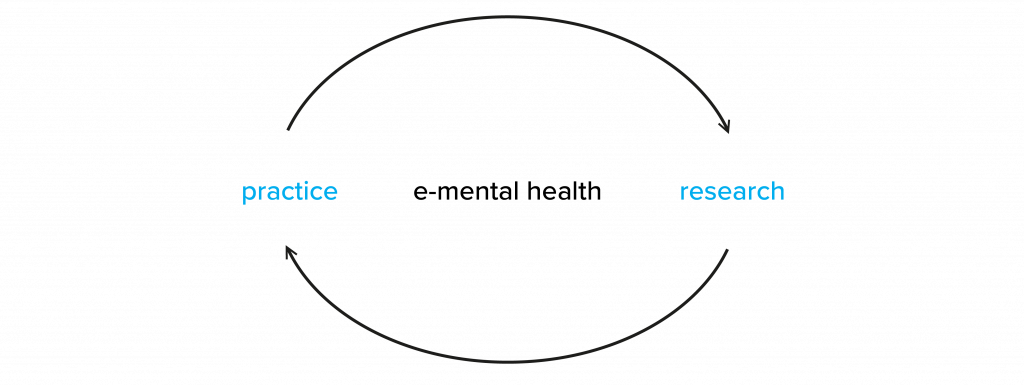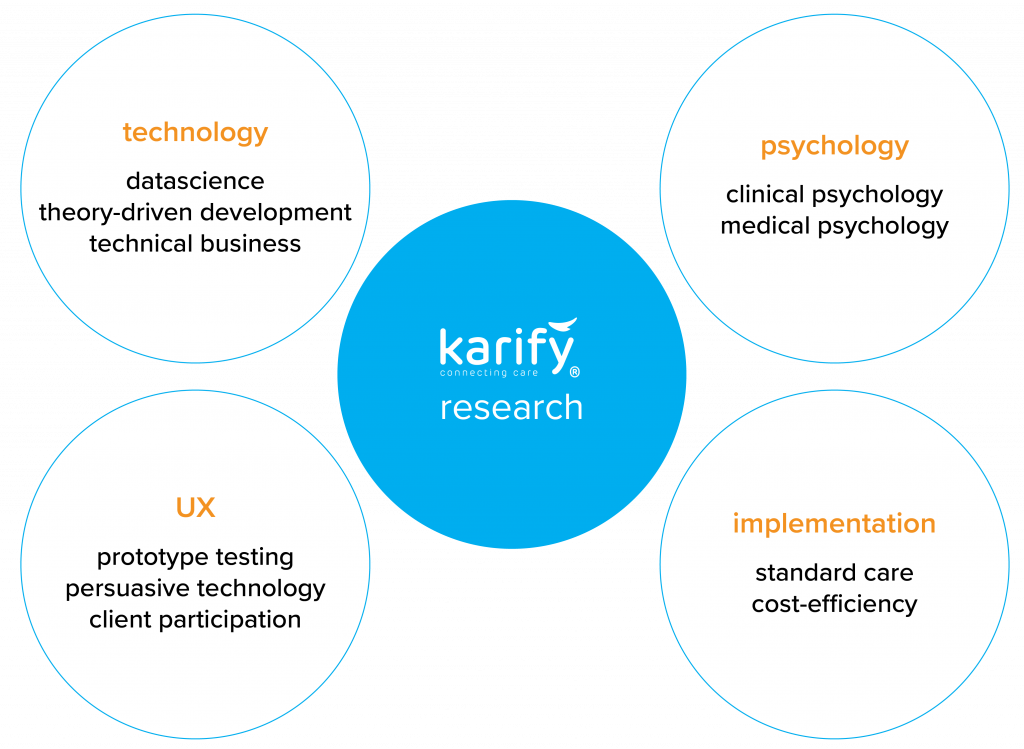Research
Research & Karify
Research is in the DNA of Karify. Ever since the establishment in 2008 Karify has been collaborating with research partners to develop evidence-based integrated care.
The goal of Karify’s research efforts is to contribute to the best possible care, to support both client and therapist during treatment.
Research and practice inform eachother – definitely in a new area like eHealth.
Sanne van den Berg,
postdoctoral researcher & research coordinator Karify


Vision and research areas
At Karify, research and new developments of the eHealth platform take place at the same time. Karify develops on the basis of scientific insights and tests innovations for the end user before, during and after these become reality. Experiences of clients and therapists contribute this way to innovation processes and generate new research questions right away.
In collaboration with academic partners, the multidisciplinary team of Karify combines the newest insights in the areas of technology, psychology, implementation and user interface and experience design.










Do you want to collaborate with Karify in scientific research?
Let us know
Click here for an overview of the research subjects and projects Karify is involved in.

Click here for an overview of the scientific publications Karify has contributed to.
CORRECT intervention
Integrated therapy psychological distress in colorectal cancer survivors
VU University Medical Center, Radboud University Medical Center
_______
SWORD study
Evidence-based treatment for the fear of cancer recurrence
Radboud University Medical Center
_______
CHANGE study
Web-based cognitive behavioral therapy for severly fatigued breast cancer survivors
Radboud University Medical Center, NKCV
_______
BREAst cancer ehealTH (BREATH) study
Online self-help recovery distress after breast cancer
Radboud University Medical Center
_______
Happy Despite Pain
Online positive psychology self-help intervention for the management of chronic pain
Maastricht University
_______
CAREST study
Online self-help ‘Less fear after cancer’
HDI, Tilburg University
_______
Online guided self-instruction for chronic fatigue
Radboud University Medical Center, NKCV
_______
Recent publications
Long-term efficacy and cost-effectiveness of blended cognitive behavior therapy for high fear of recurrence in breast, prostate and colorectal Cancer survivors: follow-up of the SWORD randomized controlled trial
Burm et al. (2019) in BMC Cancer
https://bmccancer.biomedcentral.com/articles/10.1186/s12885-019-5615-3
_______
Effectiveness of two web-based interventions for chronic cancer-related fatigue compared to an active control condition: Results of the “Fitter na kanker” randomized controlled trial.
Bruggeman-Everts et al., Journal of Medical Internet Research (2017)
https://www.jmir.org/2017/10/e336
Digital intake approach in specialized mental health care: study protocol of a cluster randomised controlled trial.
Metz et al., BMC Psychiatry (2017)
https://bmcpsychiatry.biomedcentral.com/articles/10.1186/s12888-017-1247-9
The efficacy of Internet-based cognitive behavioral therapy for severely fatigued survivors of breast cancer compared with care as usual: A randomized controlled trial.
Abrahams et al., Cancer (2017)
http://onlinelibrary.wiley.com/doi/10.1002/cncr.30815/abstract
A tailored guided internet-based cognitive-behavioral intervention for patients with rheumatoid arthritis as an adjunct to standard rheumatological care: results of a randomized controlled trial.
Ferwerda et al., Pain (2017)
https://www.ncbi.nlm.nih.gov/pubmed/28106666
Web-based cognitive behavioural therapy blended with face-to-face sessions for chronic fatigue in type 1 diabetes: a multicentre randomised controlled trial.
Menting et al., Lancet Diabetes & Endocrinology (2017)
http://thelancet.com/journals/landia/article/PIIS2213-8587(17)30098-0/fulltext
Efficacy of Blended Cognitive Behavior Therapy for High Fear of Recurrence in Breast, Prostate, and Colorectal Cancer Survivors: The SWORD Study, a Randomized Controlled Trial.
Van de Wal et al., Journal of Clinical Oncology (2017)
http://ascopubs.org/doi/abs/10.1200/JCO.2016.70.5301
Lymphoma InterVEntion (LIVE) – patient-reported outcome feedback and a web-based self-management intervention for patients with lymphoma: study protocol for a randomised controlled trial.
Arts et al., Trials (2017)
https://trialsjournal.biomedcentral.com/articles/10.1186/s13063-017-1943-2
2016
_______
Rate, timing and predictors of relapse in patients with anorexia nervosa following a relapse prevention program: a cohort study.
Berends et al., BMC Psychiatry (2016)
https://bmcpsychiatry.biomedcentral.com/articles/10.1186/s12888-016-1019-y
Blended internet care for patients with severe mental illnesses: An open label prospective controlled cohort pilot study.
Blankers et al., Internet Interventions (2016)
http://www.sciencedirect.com/science/article/pii/S2214782916300410
Tailored therapist-guided internet-based cognitive behavioral treatment for psoriasis: a randomized controlled trial.
Van Beugen et al., Psychotherapy and Psychosomatics (2016)
https://www.karger.com/Article/FullText/447267
The efficacy of guided self-instruction for patients with idiopathic chronic fatigue: A randomized controlled trial.
Janse et al., Journal of Consulting and Clinical Psychology (2016)
https://www.ncbi.nlm.nih.gov/pubmed/26950098
Study protocol of the CAREST-trial: a randomised controlled trial on the (cost-) effectiveness of a CBT-based online self-help training for fear of cancer recurrence in women with curatively treated breast cancer.
Van Helmondt et al., BMC Cancer (2016)
Earlier publications
_______
BREATH: Web-Based Self-Management for Psychological Adjustment After Primary Breast Cancer—Results of a Multicenter Randomized Controlled Trial.
Van den Berg et al., Journal of Clinical Oncology (2015)
http://ascopubs.org/doi/abs/10.1200/jco.2013.54.9386
Study protocol of the SWORD-study: a randomised controlled trial comparing combined online and face-to-face cognitive behaviour therapy versus treatment as usual in managing fear of cancer recurrence.
Van de Wal et al., BMC Psychology (2015)
https://old.biomedcentral.com/2050-7283/3/12/abstract
Testing the efficacy of web-based cognitive behavioural therapy for adult patients with chronic fatigue syndrome (CBIT): Study protocol for a randomized controlled trial.
Janse et al., BMC Neurology (2015)
https://bmcneurol.biomedcentral.com/articles/10.1186/s12883-015-0392-3
Study protocol of a multicenter randomized controlled trial comparing the effectiveness of group and individual internet-based Mindfulness-Based Cognitive Therapy with treatment as usual in reducing psychological distress in cancer patients: the BeMind study.
Compen et al., BMC Psychology (2015)
https://bmcpsychology.biomedcentral.com/articles/10.1186/s40359-015-0084-1
A web-based cognitive behaviour therapy for chronic fatigue in type 1 diabetes (Dia-Fit): study protocol for a randomised controlled trial.
Menting et al., Trials (2015)
https://trialsjournal.biomedcentral.com/articles/10.1186/s13063-015-0764-4
Effectiveness, Mediators, and Effect Predictors of Internet Interventions for Chronic Cancer-Related Fatigue: The Design and an Analysis Plan of a 3-Armed Randomized Controlled Trial.
Wolvers et al., JMIR Research Protocols (2015)
https://www.researchprotocols.org/2015/2/e77/
A randomized controlled trial of web-based cognitive behavioral therapy for severely fatigued breast cancer survivors (CHANGE-study): study protocol.
Abrahams et al., BMC Cancer (2015)
https://bmccancer.biomedcentral.com/articles/10.1186/s12885-015-1787-7
Web-based individual Mindfulness-Based Cognitive Therapy for cancer-related fatigue – A pilot study.
Bruggeman Everts et al., Internet Interventions (2015)
http://www.sciencedirect.com/science/article/pii/S2214782915000159
2013
_______
Usage of a Generic Web-Based Self-Management Intervention for Breast Cancer Survivors: Substudy Analysis of the BREATH Trial.
Van den Berg et al., Journal of Medical Internet Research (2013)
https://www.jmir.org/2013/8/e170/
Internet-Based Therapy for Adolescents With Chronic Fatigue Syndrome: Long-term Follow-up.
Nijhof et al., Pediatrics (2013)
http://pediatrics.aappublications.org/content/early/2013/05/08/peds.2012-2007
2012
_______
Effectiveness of internet-based cognitive behavioural treatment for adolescents with chronic fatigue syndrome (FITNET): a randomised controlled trial.
Nijhof et al., Lancet (2012)
http://www.thelancet.com/journals/lancet/article/PIIS0140-6736(12)60025-7/abstract
Rationale of the BREAst cancer e-healTH [BREATH] multicentre randomised controlled trial: An Internet-based self-management intervention to foster adjustment after curative breast cancer by decreasing distress and increasing empowerment.
Van den Berg et al., BMC Cancer (2012)
https://bmccancer.biomedcentral.com/articles/10.1186/1471-2407-12-394
2011
_______
Fatigue In Teenagers on the interNET – The FITNET Trial. A randomized clinical trial of web-based cognitive behavioural therapy for adolescents with chronic fatigue syndrome: study protocol.
Nijhof et al., BMC Neurology (2011)
https://bmcneurol.biomedcentral.com/articles/10.1186/1471-2377-11-23